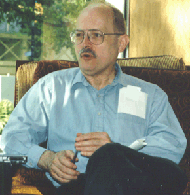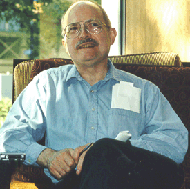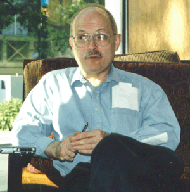

 By Alex von Thorn
By Alex von Thorn
[Mathematician and SF writer Vernor Vinge was interviewed on August 27, 2002. He was writer guest of honour at the ConJosé Worldcon, August 29–September 2, 2002, where his novella "Fast Times at Fairmont High" (The Collected Stories of Vernor Vinge, Tor) won the Hugo Award for Best Novella. Photos by Marah Searle—Ed.]
How does a mathematician become a writer?
That's a good question. From the earliest age, I was encouraged to be a mathematician. I was never especially encouraged to be a writer. My intent was to become a great scientist. However, years went by, and I found that the writing worked very well, and the mathematics went sort of well.
So what do you get out of writing?
As a child of the 1950s, it was a great surprise and joy when I would come across a story where the world was different than it was at the beginning of the story. The closest you would commonly come to would be cheats, where it would turn out that it was all a dream, and really the world was the same. So from a very early age, I was interested in science fiction. As to why I got into writing it, I'm not really sure. I was very interested in reading science fiction, and I remember telling my sister stories, and writing stories as early as the third grade. If I had actually been really good, it would have been like—do you watch Dexter on the Cartoon Network?
No, we don't get that in Canada.
Okay. Dexter would be the epitome of what science fiction written by a child would be like.
Was there anything in particular about being at UCSD (University of California at San Diego) that contributed to you becoming a writer of SF?
UCSD was an interesting school. It had just been started, and there were very low thresholds of interaction between physicists and mathematicians. I can remember when the first pulsars were discovered. I was able to go and sit down and listen to graduate students talking about what their theories, to explain what pulsars really were. It was a hotbed of real research, and it was very easy to talk to people—a very big plus.
You've written a lot about the concept of the "Singularity", a vertical leap in the evolution of intelligence. Is this just a speculation for the purpose of storytelling, or do you think this is actually likely?
It's kind of the reverse of a speculation for the purpose of storytelling. I think the Singularity, in fact, is a great burden on science fiction writers, because it's a barrier across our future. We have to come up with some sort of gimmick to be able to write about hard SF more than 50 years from now without making it a fantasy. I think it's possible that the Singularity won't happen, but I think it is one of the likely possibilities for the next 50 years.
 In an interview in wired.com [in June 1995], you said one of the reasons you're thinking about this is, "I can see it becoming weird before my eyes." Can you give me some examples of what you mean?
In an interview in wired.com [in June 1995], you said one of the reasons you're thinking about this is, "I can see it becoming weird before my eyes." Can you give me some examples of what you mean?
What's happening in our everyday life is, from day to day, more different than it was in the past. In 1970 I found little difficulty staying 30 years ahead of the man in the street, and now I find it difficult to stay 18 months ahead of the man on the street. And also, the man in the street is perfectly willing to accept that things are going to be radically different in the future.
I want to ask a mathematical question: What mechanism do you think would make it possible for the rate of progress to be a hyperbolic curve, or otherwise approach a vertical asymptote?
Models that talk about vertical asymptotes—that is, singularities—are really a statement of a simple model. The singularity is a point where some other model has to be undertaken. The difference between past progress and the present progress is the possibility of a particular invention [by which] the power of creativity were substantially increased.
In the first half of the 20th century men learned to fly and built the first atomic bomb; in the second half they went to the moon. There were a lot of things happening then; there are things happening now.
And I agree. Although I think some of the horizons are nearer now, I don't think there's a qualitatively different level of understanding. That means that what I'm really saying is of a different kind. The killer app, for Moore's law, is to substantially increase the ability to be creative. If you grant that it would happen, then it would be a change in what you and I have observed the last 50 years or so.
 That raises a question: In A Fire Upon the Deep and some of your other stories, you rely heavily on the "Net" as a social paradigm. How do you see this influencing your stories in the future?
That raises a question: In A Fire Upon the Deep and some of your other stories, you rely heavily on the "Net" as a social paradigm. How do you see this influencing your stories in the future?
First of all, the Net as it is in A Fire Upon the Deep was a faster-than-light net, which meant that I could tune the parameters however I chose, and I chose latencies and bandwidth similar to the 1980s Internet on Earth. If you get higher bandwidths and lower latencies, then you get qualitatively a different thing. In fact, one of the most common complaints about A Fire Upon the Deep is that it's not like the Net is now.
There's a great book by a fellow called Gregory Stock called Metaman [1993], in which he talks about something where the combination of our hardware and our software is certainly of superhuman capability. That is one path towards a Singularity type of situation, where we get just so good at turning the ensemble of our hardware and ourselves into a "creativity machine." I don't think it's the only way that something super-strange would happen. The classical "AI in a box" could still be it.
 You have a character (Ezr Vinh) in A Deepness in the Sky who experiences what looks like a personality dissociation. Was that intentional, and did you do any research on this?
You have a character (Ezr Vinh) in A Deepness in the Sky who experiences what looks like a personality dissociation. Was that intentional, and did you do any research on this?
There were characters who had serious dysfunctions. But I don't remember that he was one of them. You're talking about Focus?
No, after the "relight," you wrote, "Vinh felt his mind spin off in different directions..."
Oh, yes. That was sort of a classical character issue. But yeah, I think people under extreme stress kind of space out into two modes. It's strange when you're under very great stress, and you say, "Hey, this personality is coming apart. How interesting!" It's not uncommon to see that in some fiction.
It's a cliché to ask a writer where he gets his ideas from, but yours are on such a wide scale [that] the question is more relevant. So I want to know what other writers in the SF genre you admire, particularly for the depth and originality of their ideas.
I've thought about that a lot. In the first years of my writing career, I wasn't really conscious of how much I was like a fish in the water. My stuff may have looked strange, but it's because this particular fish was swimming in strange water. In particular, one book from Princeton University Press about artificial intelligence studies. It had articles by [Warren] McCulloch and people like that, that I realize now made a tremendous difference in me. I can remember thinking of all these ideas, and I thought they were mine, and then about 15 years later I remember, I went back to this book that I knew I had bought at the time, and I find all that stuff in it. So a lot of cybernetical ideas that came from real researchers.
And then, of course, writers. Heinlein was very... actually, Tolkien made a big hard-science-fictional impression on me. Which might make him spin in his grave. And Clarke, and those... There may even be a mechanical principle here; that is, to achieve success, become a fish that's swimming in different waters from everybody else.
Those are the old writers. Nowadays, I'm also impressed by current writers that are around.
Such as?
[Iain] Banks, and [David] Brin, and [Greg] Egan. I'm sure there are others.
I want to ask one last question on the subject of the Singularity, or futurism in general. What technological changes would you like to see in your lifetime?
Prolongevity is always a biggie, but one I think is really important is space travel, for personal and racial safety. Not safety for people on the Earth, but for the human race as a whole. It's not necessarily consistent with what national interest is now, which is sad.
I think the whole thing about the Singularity is radically optimistic. I mean, if that happened, it would be a good thing compared to the disasters that could otherwise happen. But the space travel thing separately would be a very positive thing, if we could only get it.
You recently retired from the academic life. What are you working on now?
I just signed off on a seven-book contract with Tor, of which three of the books are supposed to be new. And I owe them one other book, so actually I owe them four new books. That's what I should be working on, and what I am working on a lot. I've done some short stuff in the past year, like "Fast Times." I'm hoping to write a prequel that will subsume "Fast Times" and be a novel.
That's what I should be working on, and what I am working on a lot. I've done some short stuff in the past year, like "Fast Times." I'm hoping to write a prequel that will subsume "Fast Times" and be a novel.
Four books will keep you busy for a while.
I'm hoping, yes. I'll keep my nose to the grindstone. In the past, I was writing during summer vacations and stuff like that, so a person might speculate that my writing production should go up by a factor of four, right? Doesn't quite scale that way, but I'm hoping it will go up.